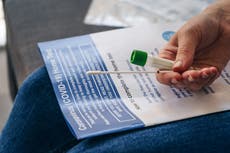Covid infections rising in every region of England and all age groups, new data shows
Cases in London trebled in just two weeks, according to Public Health England
Infection rates for Covid-19 are increasing across all regions of England, government data has shown, as the latest peak of the pandemic threatens to reach unprecedented new heights.
Cases in London, which has emerged as the new coronavirus hotspot for UK, have trebled in just two weeks, according to the latest weekly surveillance report from Public Health England (PHE).
The rate stood at 602.2 cases per 100,000 people in the seven days to 20 December, up from 200.3 in the week to 6 December.
Infections have increased throughout England, with the East recording the next highest rate after the capital (440.7) followed by the South East (380.6) and the West Midlands (218.8).
Case rates per 100,000 in England have also risen across all age groups, PHE said on Thursday.
The biggest rise is among 20- to 29-year-olds, where the rate stood at 433.8 cases per 100,000 people in the seven days to 20 December, up week-on-week from 267.2.
For 30- to 39 year-olds, the rate rose from 288.0 to 434.6 — the highest figure seen among all ages.
Rates rose from 288.7 to 412.2 among 40- to 49-year-olds, and from 220.8 to 325.0 among 50- to 59-year-olds.
These increases have coincided with a surge in hospitalisations across all English regions, expect the North East.
The hospital admission rate for Covid-19 was 18.66 people per 100,000 up to 20 December, compared to 15.18 in the previous week.
The number of coronavirus patients in English hospitals, the majority of whom are aged over 80, could pass the April peak within days.
According to the latest NHS England data, there are 18,063 patients with Covid-19 across all NHS settings — just 885 short of the 18,921 peak on 12 April.
Hospitals across London and England have already begun cancelling operations and delaying diagnostic tests, with staff redeployed to help care for patients.
Queen’s Hospital in Romford, Essex, has now been dealing with a major incident due to “huge pressure” on services over the past week.
Daily deaths are also returning to the same figures recorded during the depths of the first wave.
On Wednesday, a further 744 deaths from Covid-19 were reported by the government — the highest UK toll since 29 April — to bring the nationwide tally to 69,051.
This figure increases to 79,349 when taking into account all fatalities that recorded Covid-19 on the death certificate.
Dr Yvonne Doyle, medical director at Public Health England, urged the public to keep their distance from loved ones over Christmas and ventilate indoor settings "as much as possible”.
“Cases and hospital admission rates are increasing across many parts of the country and the number of new daily infections are rising rapidly,” she said on Thursday.
“By continuing to reduce your contacts you can help to slow the spread of Covid-19. Remember that about 1 in 3 people may never experience any symptoms so could infect others without realising it.”
Separate analysis from the Office for National Statistics (ONS) suggests that the new coronavirus variant first detected in Kent could account for around half (49 per cent) of all recent cases in England.
Concerns over the mutant variant, which scientists have concluded is spreading more rapidly than the original virus, mean millions of people in England will join those already under lockdown conditions from Boxing Day.
An estimated 645,800 people in private households in England had Covid-19 between 12 and 18 December, according to the ONS — the equivalent of around 1.18 per cent of the population, or one in 85 people.
On Thursday, China's foreign ministry said it would suspend flights to and from the UK, joining a list of nations who have imposed travel bans in light of the discovery of the variant.
Elsewhere, New York City mayor Bill de Blasio announced that authorities would personally visit all travellers from the UK to ensure they are isolating.
It comes after the UK implemented a travel ban on South Africa amid concerns over another new variant of Covid-19, which is feared to be more transmissible than that discovered in the UK.
Join our commenting forum
Join thought-provoking conversations, follow other Independent readers and see their replies
Comments

Bookmark popover
Removed from bookmarks